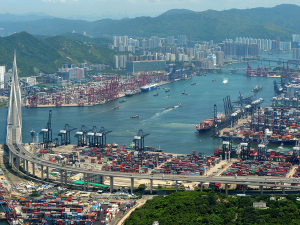Multinational American companies with their regional headquarters in Hong Kong are moving out increasingly faster from the city known to be Asia’s financial hub. An ongoing national security campaign and the struggling economy have severely dented Hong Kong’s appeal as an international finance center.
From a peak of 333 US firms in 2012, there are fewer than 240 US companies with regional hubs in the city today. In a recent piece, the Wall Street Journal reported that the number of US companies operating in Hong Kong has fallen for four years. As per the WSJ, mainland Chinese companies with regional headquarters in Hong Kong have outnumbered American ones for the first time in three decades.
In July 2021, United States President Joe Biden issued a business advisory warning American companies operating in the Asian financial hub of a “new legal landscape” under the security law that “could adversely affect” their operations.
The National Security Law 2020 allows Beijing to override the city’s once-prized legal system, often cited as a significant lure for foreign firms. Companies not only faced a growing regulatory burden to operate in Hong Kong but also had to comply with Hong Kong’s strict COVID-19-containment policies.

Added to these are uncertainties over whether Beijing will retain the Hong Kong dollar, with its peg to the US dollar. If the Hong Kong dollar is pegged to the Yuan, tighter controls on free capital flows through Hong Kong will affect its credibility as a financial center.
Not only are American firms at the receiving end of outright restrictions, but they also have to comply with censorship, data security issues, and other requirements now being imposed on Hong Kong by Beijing.
As the cost of doing business in Hong Kong increases, multinational companies are shifting resources to other centers, especially Singapore. This trend involving banks, investment firms, and technology companies has risen recently.
Geopolitical tensions between the US and China have also affected Hong Kong’s financial fortunes. While former President Donald Trump signed an order to end Hong Kong’s preferential treatment, Biden’s policies have also forced US companies to re-evaluate their operations in the city.
In August this year, President Biden signed an executive order restricting American firms from investing in Chinese tech start-ups in semiconductors and microelectronics, quantum information technologies, and some artificial intelligence systems, also covering Hong Kong firms. Hong Kong authorities have urged Washington to withdraw the “unreasonable” measures that “violate” market economy principles.
Chinese authorities have responded by raiding several American firms and blocking foreign executives from leaving mainland China. Beijing also fined US corporate due diligence firm Mintz in August for “unapproved statistical work” under the guise of national security concerns.

It has been 26 years since Hong Kong’s transfer of sovereignty from British to Chinese rule, which promised to respect the city’s freedoms – a guarantee enshrined in the territory’s functional constitution.
But in the last two and a half decades, those freedoms have been systematically curtailed, and presently, Hong Kong’s global ranking has fallen to 148th concerning human rights and press freedom.
According to the Freedom in the World report 2023, implementing the National Security Law in 2020 has amounted to a multifront attack on the “one country, two systems” framework.
Since then, hundreds of pro-democracy activists, lawmakers, and journalists have been arrested; voting rights have been curbed; and press and speech have been limited.
When Hong Kong authorities announced a bounty of HK$1 million (a little over US$125,000) in return for any information that could lead to the arrest of any of the eight political dissidents who were accused of violating the Chinese enclave’s controversial National Security Law, foreign companies noted the financial center’s journey towards autocracy.
This has played no small part in the exit of business firms, creating a chilling effect for the Hong Kong overseas community.
Overall, the percentage of US companies using Hong Kong as their regional headquarters has dropped from 23.5 percent to 17.4 percent between 2011 and 2021. Despite being home to the top-ranked stock markets globally with a market value of around US$4.3 trillion, Hong Kong compares poorly on turnover, with a daily average of US$11.3 billion compared with US$261 billion for Nasdaq, US$27.9 billion for Japan and US$77.9 billion for China’s Shenzhen exchange.
The Hang Seng Stock Index (.HSI) and the Hang Seng China Enterprises Index (.HSCE) are down more than 11% each this year. A partner of Alex KY Wong Asset Management Company said, “Market sentiment is even worse than 2008,” referring to the Global Financial Crisis.
To repair the damage to its reputation as a financial hub, the Hong Kong government gave away 500,000 air tickets to the city earlier this year. Now, Hong Kong leader John Lee has announced an immigration plan tied to investments and a cut in the stamp duty on stock trades.
But in the wake of American companies like Mintz Group and Capvision being raided by Chinese authorities, several firms, like Vantage Data Centres and Alberta Management Corp., have abandoned plans to open offices in Hong Kong in favor of Singapore. Meanwhile, the number of Chinese companies in Hong Kong has more than doubled.
- Vaishali Basu Sharma is an analyst of strategic and economic affairs. She has consulted with India’s National Security Council Secretariat (NSCS) for nearly a decade. She is presently associated with the New Delhi-based think tank Policy Perspectives Foundation.
- The author can be reached at postvaishali (at) gmail (dot) com.




